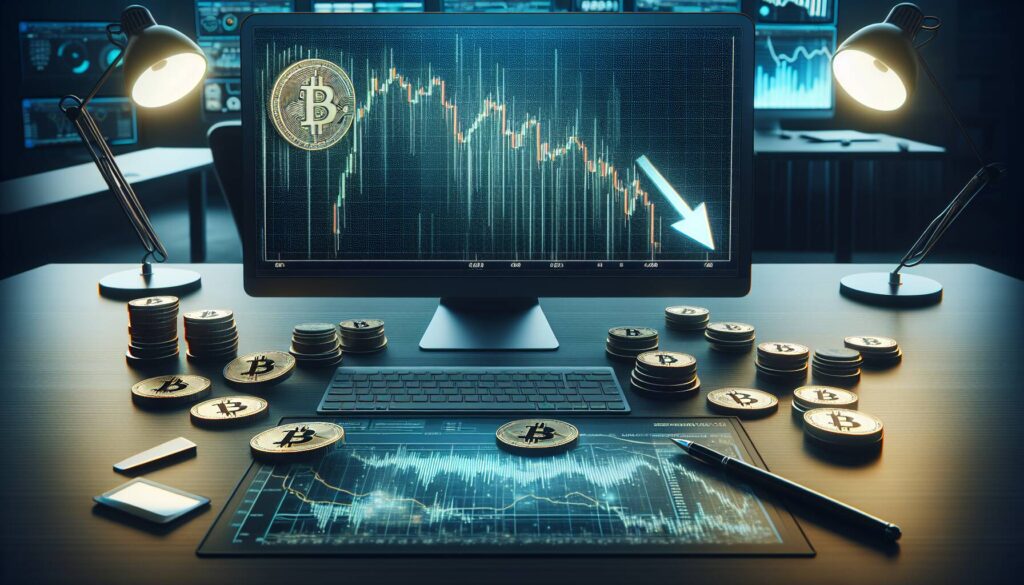In a recent address at the Economic Club of New York, BlackRock CEO Larry Fink shared his outlook on the current state of the financial markets, including the cryptocurrency sector. Drawing attention to the recent downturn, Fink predicted that markets could experience an additional drop of up to 20%. However, he views this as a potential buying opportunity for long-term investors, suggesting that the current situation does not represent a systemic risk to the economy. “I see it more as a buying opportunity than a selling opportunity,” he stated, while also acknowledging the possibility of further declines.
Fink’s insights come at a time when inflationary pressures are mounting, exceeding expectations among market participants. He also noted that many believe the U.S. is currently in a recession. Because of this economic backdrop, he does not foresee the Federal Reserve making any interest rate cuts this year. This cautious stance reflects a broader uncertainty that has been influencing investor behavior across various asset classes.
“Inflationary pressure is higher than market participants expect,” Fink mentioned, highlighting the complexities facing investors today.
His comments are especially relevant as the cryptocurrency market grapples with fluctuations fueled by macroeconomic factors. Bitcoin, for instance, has seen a decline of 5% over the past week and an alarming 11% month-over-month drop. These figures come amidst a broader trend in the equity markets, where the S&P 500 and Nasdaq have experienced declines of 13% and 15%, respectively, amid fears triggered by trade policies initiated by U.S. President Donald Trump.
Fink’s previous statements have also positioned Bitcoin as a potential threat to the U.S. dollar, raising questions about the future of traditional currencies. He cautioned that if Americans begin to perceive cryptocurrencies as safer assets than the dollar, it could have serious implications for the currency’s stability.

Market Insights from BlackRock CEO Larry Fink
Key insights regarding the current market situation and its implications for investors:
- Potential Market Decline: Fink predicts that the market could experience an additional 20% drop.
- Buying Opportunity: He views the current market drawdown as a buying opportunity for long-term investors.
- Systematic Risk: Fink states that the current situation does not pose a systematic risk.
- Inflationary Pressures: The CEO notes that inflation is higher than market participants expect, impacting investment decisions.
- Interest Rates Outlook: Fink does not anticipate the Federal Reserve to cut interest rates this year, suggesting ongoing economic challenges.
- Concerns Over Bitcoin: In a recent letter to shareholders, he warned about Bitcoin’s threat to the U.S. dollar, emphasizing its potential impact on traditional currency stability.
- Volatile Market Conditions: Markets including cryptocurrency have been turbulent following announcements on tariffs by former President Trump, affecting overall market confidence.
- Recent Market Performance: Bitcoin is down 5% over the last five days and 11% over the past month, while the S&P 500 and Nasdaq are down 13% and 15%, respectively.
These insights suggest that while the market might face further declines, careful and strategic investments could prove beneficial for those with a long-term perspective.
Market Insights from BlackRock: A Long-Term Perspective Amidst Turbulence
In a recent address, BlackRock’s CEO Larry Fink raised eyebrows by projecting a possible 20% decline in the market while simultaneously labeling the current dip as a golden opportunity for long-term investors. This viewpoint stands in stark contrast to many market analysts who remain cautious, heightening the competitive discourse within the financial advisory realm. Fink’s philosophy emphasizes patience and long-term strategies, positioning BlackRock as a forward-thinking entity in a sea of uncertainty. This can particularly resonate with institutional investors and long-term holders who prioritize future gains over immediate reactions to market fluctuations.
However, Fink’s assertion does have its disadvantages. A forecast of potential further decline might deter more risk-averse investors from engaging with the market. Individual investors, especially those sensitive to volatility, could view this as a warning signal rather than an opportunity, leading to potential capital flight from riskier assets. This sentiment can amplify market insecurity, especially in tandem with concerns over inflation and recessionary pressures that Fink elaborated on during his speech.
The implications of Fink’s remarks could significantly impact various stakeholders. For seasoned investors and institutions that can withstand short-term losses, this insight might encourage a strategic accumulation of assets at lower prices. Conversely, for newcomers and everyday investors who might be skittish about impending losses, Fink’s commentary could create hesitation and indecision. Furthermore, the shadow cast by Bitcoin’s potential threat to the U.S. dollar adds another layer to the conversation for investors entrenched in the cryptocurrency scene, as they juggle the inherent risks and benefits of this digital asset during turbulent times in the traditional market.
Fink’s perspective not only highlights BlackRock’s commitment to long-term investment strategies but also places the firm in a competitive advantage by attracting confidence from institutional players willing to adopt a risk-on approach. Ultimately, while Fink is optimistic about the opportunities ahead, the ongoing market volatility could serve as both a challenge and a pathway for different types of investors in the financial landscape.

















